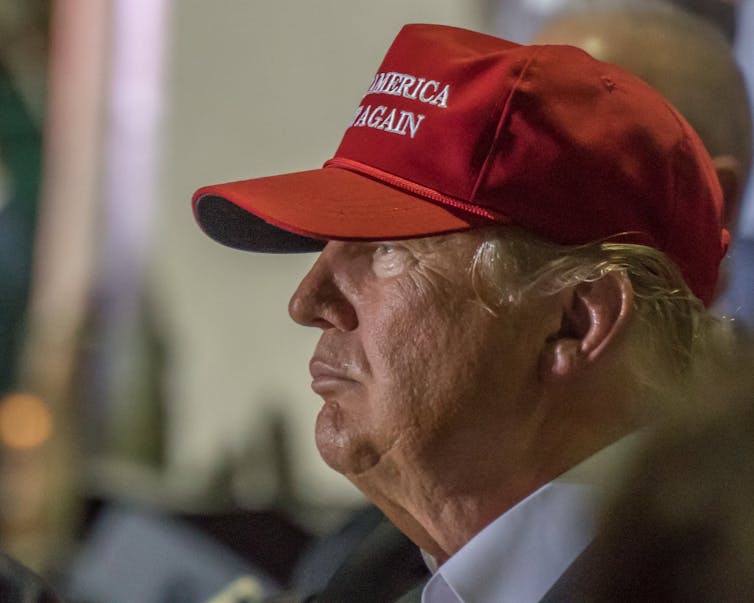
Donald Trump’s presidency has been a rocky one to say the least. Facing controversy, competition and more, Trump’s approval rating has only once managed to reach the 45% he achieved at his inauguration in January 2017.
Trump is a very different kind of politician, one who relied on his businessman brand, rather than a political background, to win the White House. From the very beginning of his campaign, he has used commercial branding principles to create loyalty and desire around strong brand values. Even before announcing he would run, Trump trademarked the slogan “Make America Great Again”, and has already trademarked “Keep America Great” for a re-election campaign.
Trump has always been good at branding. Building on the success of his father’s real estate business, Trump made his name focusing on luxury tower blocks in Manhattan, including the iconic 58-floor Trump Tower on Fifth Avenue. In 1987 he published The Art of the Deal, which cemented him as a celebrity businessman. This fame was later bolstered by his hosting of US television programme The Apprentice, as well as other frequent media appearances.
Forbes now estimates Trump’s net worth to be US$3.1 billion, with his “brand businesses” – which license the Trump name to buildings and other products for a fee – worth US$170m of that.
Trump the brand
To be successful, a brand must be two things: visually ubiquitous and “authentic”. Logos, symbols and names must be repeated in physical environments and communications that build the brand’s authenticity. An obvious example is Trump’s Make America Great Again slogan being embroidered on red trucker hats, which he himself models frequently at political rallies, which makes his branding seem more genuine.
The ability to be perceived as authentic comes from avoiding a traditional, polished approach. Instead authentic brands are more transparent, show “warts and all”, and are imbued with personal meaning. Consumers will see a brand or product as authentic when they feel they can identify with it, and when they feel that there has been creativity and sincerity in the process of its creation.
For Trump, this authenticity is frequently bolstered through his language and impulsive use of social media. Whether we agree with his sentiments or not, there is an authenticity to Trump’s brand voice. What you hear, is what you get. Trump is a master of short, sharp phrases – “drain the swamp” and “build the wall”, for example – which are easily memorable and appeal directly to the patriotic, protectionist ideology of his middle American voters.
This type of simple, of-the-people language has continued into his presidency too. Trump’s January 2018 State of the Union address was a rousing, yet straightforward, speech that focused on a core brand message of American patriotism: “This is your time. If you work hard, if you believe in yourself, if you believe in America, then you can dream anything, you can be anything, and together, we can achieve anything.” This theme was repeated later that year in his address to the United Nations, where he withdrew from a number of UN initiatives, emphasising that “America is governed by Americans.
The American Dream
The idea that Trump is the only one able to give everyone the American dream is fundamental to his political brand. In his inaugural address Trump claimed that America was a successful nation that had suffered “carnage” at the hands of other countries, Washington politicians and terror groups. American workers were left without jobs, factories shut down and the country’s wealth stolen and dispersed internationally.
Trump presented a powerful business vision and plan, positioning himself as a leader ready to deliver actions and not words. He would put “America First”, protect the American people and create jobs for American workers. The speech was highly evocative of the American dream, with Trump emphasising that his election would put the “forgotten men and women” of America back in power:
We will bring back our jobs. We will bring back our borders. We will bring back our wealth. And we will bring back our dreams.
The authenticity Trump achieved from positioning himself as a symbol of the American dream based on the success of the Trump commercial brand is impressive. However, according to Forbes the Trump corporation is currently in decline, with a US$2 billion reduction of the organisation’s net worth. Forbes attributes this partly to global devaluation of commercial property space due to e-commerce, but also to the fact that Trump’s polarising politics have moved the brand on from being associated with luxury to representing “divisiveness, embarrassment and questionable morals”, as one of their sources put it.
Associations are one of the strongest ways in which brands affirm their values and encourage users to align with them. Think of Coca-Cola’s clever Christmas marketing, or Nike’s success in aligning with top athletes. Successful brands are in tune with their stakeholders’ concerns, and the society and environment in which they operate. But big brands including Nascar, the PGA tour and more, have pulled away from the Trump brand for fear of being aligned with the wrong values.
The question for Trump as he heads into the second half of his presidential term is whether the relationship between the commercial brand and the political brand has run its course. Mounting dissatisfaction with his xenophobic and misogynistic views may mean he becomes inauthentic for a growing number of American voters, and even the Trump organisation has developed business propositions without the Trump name. The current partial government shutdown means that it is not only the commercial Trump brand which is in trouble. The president’s perceived ability to be able to deliver the American dream is at serious risk too, and this is likely to undermine any bid for a second term.
Sian Rees, Associate Professor in Public Relations, Marketing and Branding, Swansea University
This article is republished from The Conversation under a Creative Commons license. Read the original article.